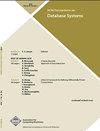DomainNet: Homograph Detection and Understanding in Data Lake Disambiguation
IF 2.2
2区 计算机科学
Q3 COMPUTER SCIENCE, INFORMATION SYSTEMS
引用次数: 0
Abstract
Modern data lakes are heterogeneous in the vocabulary that is used to describe data. We study a problem of disambiguation in data lakes: How can we determine if a data value occurring more than once in the lake has different meanings and is therefore a homograph? While word and entity disambiguation have been well studied in computational linguistics, data management, and data science, we show that data lakes provide a new opportunity for disambiguation of data values, because tables implicitly define a massive network of interconnected values. We introduce DomainNet, which efficiently represents this network, and investigate to what extent it can be used to disambiguate values without requiring any supervision. DomainNet leverages network-centrality measures on a bipartite graph whose nodes represent data values and attributes to determine if a value is a homograph. A thorough experimental evaluation demonstrates that state-of-the-art techniques in domain discovery cannot be re-purposed to compete with our method. Specifically, using a domain discovery method to identify homographs achieves an F1-score of 0.38 versus 0.69 for DomainNet, which separates homographs well from data values that have a unique meaning. On a real data lake, our top-100 precision is 93%. Given a homograph, we also present a novel method for determining the number of meanings of the homograph and for assigning its data lake attributes to a meaning. We show the influence of homographs on two downstream tasks: entity-matching and domain discovery.DomainNet:数据湖消歧中的同源图检测与理解
现代数据湖在用于描述数据的词汇表中是异构的。我们研究了数据湖中的消歧义问题:我们如何确定在湖中出现多次的数据值是否具有不同的含义,因此是一个同形词?虽然词和实体消歧已经在计算语言学、数据管理和数据科学中得到了很好的研究,但我们表明,数据湖为数据值消歧提供了一个新的机会,因为表隐式地定义了一个相互关联的值的庞大网络。我们引入了DomainNet,它有效地代表了这个网络,并研究了它在多大程度上可以在不需要任何监督的情况下用于消除值的歧义。DomainNet利用二部图上的网络中心性度量,该二部图的节点表示数据值和属性,以确定值是否为同形图。一个彻底的实验评估表明,最先进的领域发现技术不能被重新用于与我们的方法竞争。具体来说,使用域发现方法识别同音异义词的f1得分为0.38,而DomainNet的f1得分为0.69,后者可以很好地将同音异义词与具有独特含义的数据值区分开来。在真实的数据湖中,我们的前100名精度为93%。给定一个同形词,我们还提出了一种新的方法来确定同形词的意义数量,并将其数据湖属性分配给一个意义。我们展示了同形异义词对两个下游任务的影响:实体匹配和领域发现。
本文章由计算机程序翻译,如有差异,请以英文原文为准。
求助全文
约1分钟内获得全文
求助全文
来源期刊

ACM Transactions on Database Systems
工程技术-计算机:软件工程
CiteScore
5.60
自引率
0.00%
发文量
15
审稿时长
>12 weeks
期刊介绍:
Heavily used in both academic and corporate R&D settings, ACM Transactions on Database Systems (TODS) is a key publication for computer scientists working in data abstraction, data modeling, and designing data management systems. Topics include storage and retrieval, transaction management, distributed and federated databases, semantics of data, intelligent databases, and operations and algorithms relating to these areas. In this rapidly changing field, TODS provides insights into the thoughts of the best minds in database R&D.
 求助内容:
求助内容: 应助结果提醒方式:
应助结果提醒方式:


